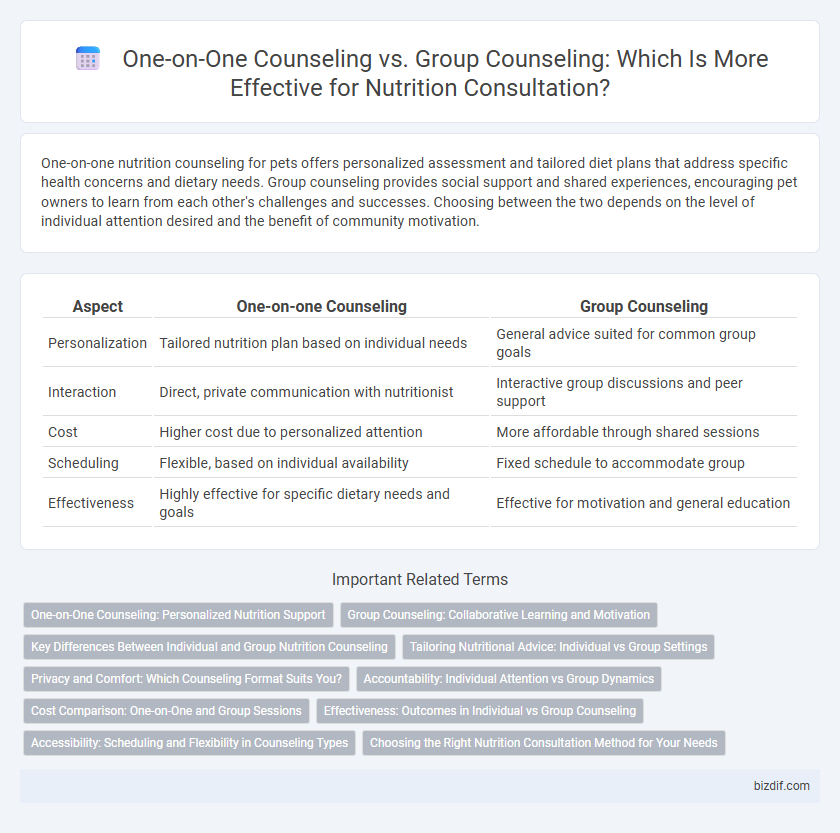One-on-one nutrition counseling for pets offers personalized assessment and tailored diet plans that address specific health concerns and dietary needs. Group counseling provides social support and shared experiences, encouraging pet owners to learn from each other's challenges and successes. Choosing between the two depends on the level of individual attention desired and the benefit of community motivation.
Table of Comparison
| Aspect | One-on-one Counseling | Group Counseling |
|---|---|---|
| Personalization | Tailored nutrition plan based on individual needs | General advice suited for common group goals |
| Interaction | Direct, private communication with nutritionist | Interactive group discussions and peer support |
| Cost | Higher cost due to personalized attention | More affordable through shared sessions |
| Scheduling | Flexible, based on individual availability | Fixed schedule to accommodate group |
| Effectiveness | Highly effective for specific dietary needs and goals | Effective for motivation and general education |
One-on-One Counseling: Personalized Nutrition Support
One-on-one nutrition counseling offers personalized support tailored to an individual's unique dietary needs, lifestyle, and medical history, ensuring targeted and effective nutrition plans. This individualized approach allows for detailed assessment and continuous adjustment based on personal progress and challenges. Personalized nutrition support improves adherence to dietary recommendations, enhances motivation, and leads to better health outcomes compared to group counseling settings.
Group Counseling: Collaborative Learning and Motivation
Group counseling in nutrition consultation fosters collaborative learning by enabling participants to share experiences, challenges, and strategies, enriching knowledge through diverse perspectives. This setting enhances motivation as peer support and accountability encourage sustained behavior change and adherence to nutritional goals. The dynamic interaction within groups often leads to increased engagement, making it an effective approach for collective health improvement.
Key Differences Between Individual and Group Nutrition Counseling
One-on-one nutrition counseling offers personalized dietary assessments and customized meal plans tailored to individual health conditions, preferences, and goals. Group nutrition counseling provides peer support and shared learning experiences, enhancing motivation and accountability through communal interaction. Individual sessions allow for private discussion of sensitive health issues, whereas group settings facilitate social engagement and cost-effective access to nutritional guidance.
Tailoring Nutritional Advice: Individual vs Group Settings
One-on-one nutrition counseling allows for personalized dietary recommendations based on an individual's specific health status, lifestyle, and preferences, enabling precise goal setting and progress monitoring. In contrast, group counseling provides a collaborative environment where general nutritional principles are shared, fostering peer support but limiting the ability to address unique dietary needs. Tailoring nutritional advice is more effective in individual sessions due to the focused assessment and customized interventions.
Privacy and Comfort: Which Counseling Format Suits You?
One-on-one nutrition counseling ensures personalized guidance in a private setting, allowing clients to openly discuss sensitive health concerns without hesitation. Group counseling promotes shared experiences and mutual support but may limit individual privacy, potentially affecting comfort levels. Choosing between formats depends on your preference for confidential, tailored advice or collaborative learning within a supportive community.
Accountability: Individual Attention vs Group Dynamics
One-on-one nutrition counseling offers personalized guidance, enhancing accountability through tailored goal-setting and regular progress monitoring. In contrast, group counseling leverages social support and shared experiences, fostering motivation and collective accountability. Choosing between individual attention and group dynamics depends on personal preferences and the desired level of interaction for sustained nutritional success.
Cost Comparison: One-on-One and Group Sessions
One-on-one nutrition counseling typically involves higher costs due to personalized attention and tailored meal plans, averaging $60 to $150 per session. Group counseling sessions offer a more affordable alternative, ranging from $20 to $50 per participant, by spreading the expense among multiple clients. Cost-effectiveness depends on individual needs and preferences, with group sessions providing budget-friendly options while one-on-one ensures a more customized approach.
Effectiveness: Outcomes in Individual vs Group Counseling
One-on-one nutrition counseling offers personalized strategies tailored to an individual's unique health needs, resulting in higher adherence and more significant outcomes in weight management and chronic disease control. Group counseling fosters peer support and shared learning experiences, which enhance motivation but may dilute individualized attention, impacting the precision of dietary recommendations. Research indicates that combined approaches integrating personalized feedback within group settings optimize behavior change and long-term nutritional improvements.
Accessibility: Scheduling and Flexibility in Counseling Types
One-on-one nutrition counseling offers personalized scheduling options tailored to individual needs, enhancing flexibility for clients with busy or irregular timetables. Group counseling sessions typically follow fixed schedules, which may limit accessibility for participants with varying availability. The choice between these counseling types significantly impacts client convenience and adherence to nutrition plans.
Choosing the Right Nutrition Consultation Method for Your Needs
One-on-one nutrition counseling provides personalized dietary guidance tailored to individual health goals, medical conditions, and lifestyle preferences, ensuring specific nutrient requirements are met. Group counseling offers social support and shared experiences, fostering motivation and accountability while addressing common nutritional challenges in a cost-effective setting. Selecting the right consultation method depends on personal learning style, budget, and the level of customized attention needed for optimal dietary progress.
One-on-one Counseling vs Group Counseling Infographic

 bizdif.com
bizdif.com